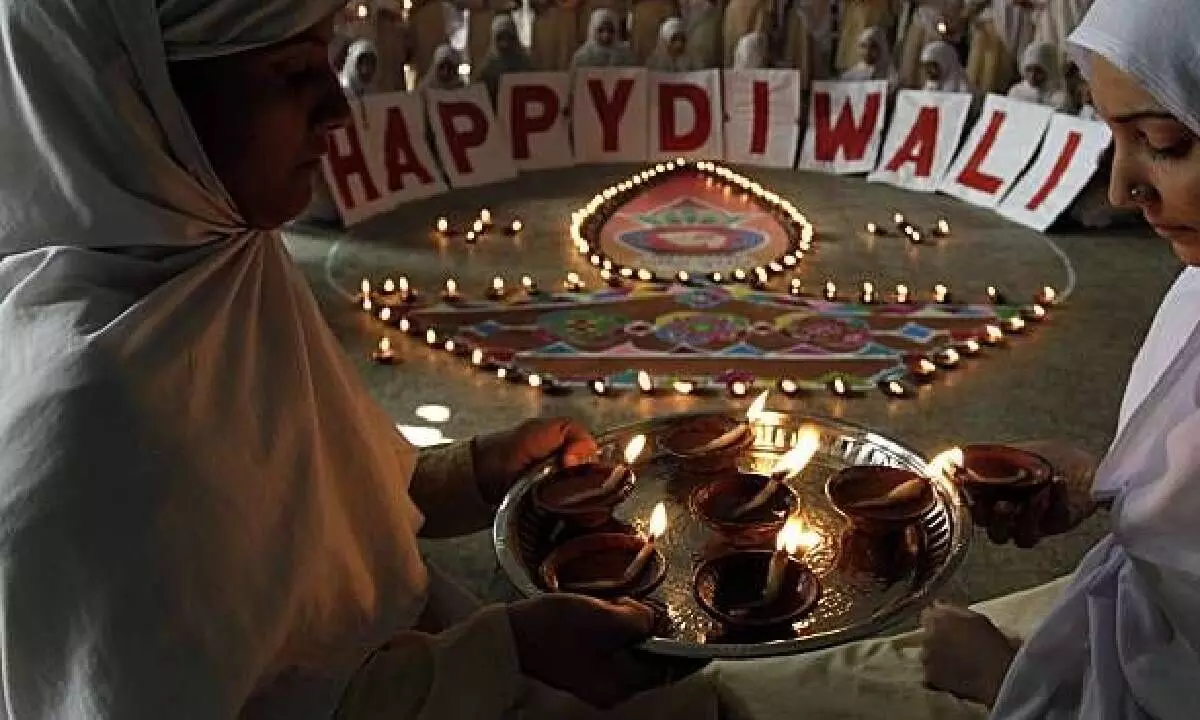Diwali illuminates the world; promotes universal brotherhood like few others
Every Indian festival binds people together from all faiths for a joyous celebration
image for illustrative purpose

No festival symbolises communal harmony like Diwali does. The festival of lights is celebrated with noticeable gaiety and fervour by all sections of Indians.
Although Hindus, Sikhs, Buddhists and Jains have been celebrating it for centuries together, Christians and Muslims have also joined in to celebrate it on a grand note.
If you visit Bishop House, which houses the highest seat of the religion here, in the heart of Delhi around Diwali time, you would find it fully illuminated.
The Jamia Millia Islamia (JMI) campus is right now all geared up for Diwali festivities. Like in the past, major buildings of JMI would be lit. An official of the prestigious institute says that even though JMI is grappling with several issues, some buildings would be decked up for Diwali.
Gol Masjid, a couple of minutes away from India Gate, is set for Diwali illumination. This pioneering initiative goes to the august credit of the highly respected Islamic scholar and Imam of Gol Masjid, Maulana Jameel Ahmad, who began the practice of having diyas outside the masjid around forty years back.
His Maulana Omer Ilyasi, a champion of Inter-faith dialogue, is continuing the legacy of his father. “Being a Muslim does not stop me from celebrating Diwali. When my Hindu friends celebrate Eid with equal gusto, why should we not celebrate Diwali with them,” Maulana Omer argues forcefully.
It is ditto with Delhi Brotherhood Society (DBS), which illuminates their Brothers House. The Society has established the venerable St. Stephen's College and many equally reputed schools and colleges.
Brother Solomon George, member of DBS, explains “The nation is in a festive mood. We celebrate Diwali with our Hindu friends and colleagues. There are many Hindus who work on our projects, which are spread across India. As Charismas has become an Indian festival, which is celebrated equally enthusiastically by Hindus and people of other faiths, we celebrate Diwali.”
While on Diwali and Delhi Brotherhood Society, it is worth recalling that Mahatma Gandhi’s close friend Charles Freer Andrews was an Anglican priest and member of Delhi Brotherhood society. C.F. Andrews was equally close to Gurudev Rabindranath Tagore.
If you go to Mumbai, you will see a dazzlingly lit Haji Ali Dargah, much like Hazrat Nizamudin Dargah in Delhi. The famed dargah of Baba Hazrat Maqbool Hussein Madani in Pune is decorated with diyas every Diwali, a practice that is in vogue for a long time now.
A massive show of lights, colours and decorations are symbolic of Diwali. Festivals of any religion or community seek to bring together people from all backgrounds in the joyous celebration.
Meanwhile, Muslims have been celebrating Diwali since ages. It is said that Muhammad bin Tughlaq, who ruled Delhi from 1324 to 1351, is arguably the first emperor to celebrate a Hindu festival inside his court. It was celebrated with bonhomie and good food, organized by Tughlaq’s Hindu wives. According to noted author and historian, Ishmeet Nagpal, “During Akbar’s time, Diwali was a grand festival in the Mughal court. Akbar began the tradition of giving sweets on the occasion. Chefs from across kingdoms cooked delicacies in the Mughal court, including ghevar, petha, kheer, peda, jalebi, phirni and shahitukda, which became part of the celebratory thali that welcomed guests.”
The Diwali programmes in Akbar’s court included reading of the Ramayan, which was followed by a play depicting Lord Ram’s return to Ayodhya. This tradition strengthened Akbar’s empire, (noted by his biographer Abu’lFazl in Ain-i-Akbari), as it helped the king bond better with his Hindu subjects, and encouraged many Muslim merchants to take part in the festivities.
Diwali is a major festival in Jainism, Buddhasim and Sikhism, who celebrate it for five days.
The term Diwali is derived from the Sanskrit work Deepavali, meaning ‘row of lights’. The festival generally symbolizes the victory of light over darkness.
The Jains celebrate Diwali to mark the spiritual awakening of Lord Mahavira, marking mankind’s enlightenment from darkness.
As far as Sikhs, Diwali marks the commemoration of the return of their young spiritual leader Guru Hargobind, the sixth guru to the holy city of Amritsar on release from wrongful imprisonments. Some Buddhists celebrate the festival to honour Emperor Ashoka’s decision to convert to Buddhism and pursue the path of peace and righteousness.
Says Maqsood Ahmed, a teacher in Delhi’s acclaimed Anglo Arabic School, “I feel honoured that we celebrate so many festivals in India. I love to celebrate Diwali, Eid and Holi with my family and friends. ”
(The author is Delhi-based senior journalist and writer. He is author of Gandhi's Delhi which has brought to the forth many hidden facts about Mahatma Gandhi)

